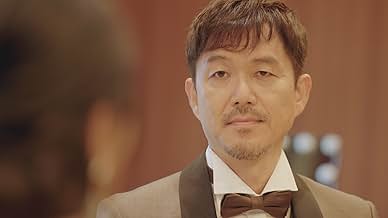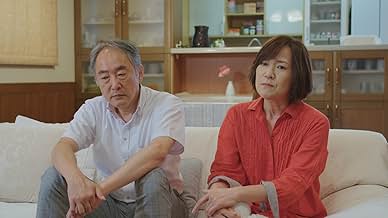IMDb RATING
7.0/10
1.1K
YOUR RATING
In this reality dating series, marriage-minded singles in Japan meet, date, and get engaged before ever setting eyes on each other.In this reality dating series, marriage-minded singles in Japan meet, date, and get engaged before ever setting eyes on each other.In this reality dating series, marriage-minded singles in Japan meet, date, and get engaged before ever setting eyes on each other.
Browse episodes
Featured reviews
I really enjoyed this series. As an American that has never been to Japan, I found it even more interesting to learn about the culture and how the contestants went about dating. The contestants led with their brain instead of their heart which is typically seen in American dating shows. I also enjoyed seeing the places that they visited for the getaway and the apartments that they lived in leading up to the wedding. Plus their budget is huge as shown by the design for the pods, living quarters, the flower filled bridge for where the couple meets if they get engaged and the hotel for the getaway!
The contestants took the experience seriously especially when compared to those on the American version. Although some of the contestants fell for the same person, there wasn't any animosity or drama over it. There were no cat fights and both the male and female groups provided a sense of support for one another. This show was filled with love and you can't but hope that everyone finds someone.
I liked that the couples who did get "married" or just walked down the aisle showed that it is possible to fall in love without seeing the other first. I enjoyed hearing about their reservations before the wedding and how they worked on them as a couple. All of the couples took the dating process more seriously and that is shown in the types of conversations that they had on the dates.
The contestants took the experience seriously especially when compared to those on the American version. Although some of the contestants fell for the same person, there wasn't any animosity or drama over it. There were no cat fights and both the male and female groups provided a sense of support for one another. This show was filled with love and you can't but hope that everyone finds someone.
I liked that the couples who did get "married" or just walked down the aisle showed that it is possible to fall in love without seeing the other first. I enjoyed hearing about their reservations before the wedding and how they worked on them as a couple. All of the couples took the dating process more seriously and that is shown in the types of conversations that they had on the dates.
Love is Blind Japan presents a captivating departure from the familiar dramatic flair of its American and Swedish counterparts. Unlike the exaggerated narratives that often overshadow sincerity in those versions, the Japanese adaptation offers a refreshing authenticity. Contestants in the Japanese version exhibit a keen awareness of their conversations, emphasizing meaningful dialogue over scripted drama.
One notable aspect is how conflicts are approached with artful skill and respect, showcasing a cultural nuance that adds depth to the show. The contestants, in their pursuit of love, demonstrate an admirable commitment to genuine connections. In a television landscape saturated with manufactured drama, Love is Blind Japan stands out as a more serious and realistic social experiment.
The subdued and muted demeanor of the participants contributes to a less theatrical, more realistic portrayal of relationships. The editing, too, reflects a commitment to authenticity, creating an immersive viewing experience. This Japanese adaptation feels less predictable than its American counterpart, providing a refreshing and unpredictable take on the familiar reality TV formula. For those seeking a departure from the norm, Love is Blind Japan offers a thoughtful and nuanced exploration of love and relationships. The cultural nuance in conflict resolution, although admirable, might not resonate with audiences seeking the thrill of more confrontational shows. The show's commitment to authenticity, while commendable, may inadvertently contribute to a less engaging viewing experience for some.
In the grand landscape of reality TV, where sensationalism often reigns supreme, Love is Blind Japan earns points for sincerity but might lose others for perceived boredom. Its unique approach may appeal to those craving a more realistic portrayal of relationships, but it could leave others longing for the exaggerated drama characteristic of many reality shows.
Considering the mix of cultural depth and potential dullness, the show earns a modest verdict of 6.5. While it offers a different flavor of reality TV, its appeal may be subjective, catering to those who appreciate subtlety in love stories but falling short for those seeking more traditional entertainment. Making it boring and uninteresting.
One notable aspect is how conflicts are approached with artful skill and respect, showcasing a cultural nuance that adds depth to the show. The contestants, in their pursuit of love, demonstrate an admirable commitment to genuine connections. In a television landscape saturated with manufactured drama, Love is Blind Japan stands out as a more serious and realistic social experiment.
The subdued and muted demeanor of the participants contributes to a less theatrical, more realistic portrayal of relationships. The editing, too, reflects a commitment to authenticity, creating an immersive viewing experience. This Japanese adaptation feels less predictable than its American counterpart, providing a refreshing and unpredictable take on the familiar reality TV formula. For those seeking a departure from the norm, Love is Blind Japan offers a thoughtful and nuanced exploration of love and relationships. The cultural nuance in conflict resolution, although admirable, might not resonate with audiences seeking the thrill of more confrontational shows. The show's commitment to authenticity, while commendable, may inadvertently contribute to a less engaging viewing experience for some.
In the grand landscape of reality TV, where sensationalism often reigns supreme, Love is Blind Japan earns points for sincerity but might lose others for perceived boredom. Its unique approach may appeal to those craving a more realistic portrayal of relationships, but it could leave others longing for the exaggerated drama characteristic of many reality shows.
Considering the mix of cultural depth and potential dullness, the show earns a modest verdict of 6.5. While it offers a different flavor of reality TV, its appeal may be subjective, catering to those who appreciate subtlety in love stories but falling short for those seeking more traditional entertainment. Making it boring and uninteresting.
Not only did the people act in a much classier way (such as not swearing, not talking about their sex lives, wearing more modest clothes) but they acted nicer to each other and it showed in the friendships formed in the female/male groups. I felt I learned a lot about Japanese culture and how it has changed over the last decades. For example I was surprised that these couples easily wanted to live together immediately as I thought that was still kind of taboo in Japan. I really felt the emotions were very real in this show, especially when the men would cry / be upset. It made me sad when one of them was crying, man or woman and I felt sorry for the couples who broke up early on, but was glad it wasn't up at the alter like the American version. That made it also seem more realistic. And the couples that made it through were so adorable. I really hope there will be a season 2 of this version. My favorite part in each show is the wedding gown try ons and the wedding scenes, the women look so beautiful.
I was really interested to see how this show would translate to a culture where people don't open up so easily, and I was really pleasantly surprised. By the end of the show I felt my time was well spent exploring the concerns about relationships between contestants and partners, and it made me reflect on my own life as well. This is a rare quality for reality tv.
Good points: -The producers focus on the human emotions and experience, not the drama. This is what reality tv should be like!! The US version feels so drama-focused it feels like it's scripted at times, but the Japan version feels natural. Yet even though, there are still tons of surprises and tension in the Japan version. The stakes almost feel higher in the Japan version as well.
-Culturally, Japan takes match making much more serious than the US, so the contestants are on the show for love, not to become influencers like the US version. Even towards the end everyone isn't forced to wait until the altar to say "yes/no" in a performative way. This makes the show feel genuine, creates unexpected moments, and makes you even more invested in seeing the success of certain relationships.
-The budget is really high. So much higher than the US version, so it doesn't feel like any other cheap reality show. For example, they stay at Hosinoya Resort in Okinawa, one of the most luxurious resorts in Japan. They also dine in several high class restaurants. This will allow overseas viewers to see a different side of Japan.
-The aesthetic is on point. They clearly brought in designers to create pods that are creative, sophisticated, and more interactive than the US version via little doors that fit seamlessly in the design where contestants can exchange items. This makes the experience more personable for contestants. Also, the area where the contestants meet for the first time is very romantic and uniquely Japan with flowers hanging down and a bridge over water; much more magical than the US's red carpet.
-The music pairings are good.
-The producers didn't try to incite jealousy by forcing contestants to have conversations about other people they had crushes on. The US version does this too often.
-There is a lot of diversity in the cast despite being a Japan-focused show culturally, ethnically, and socio-economically. I hope this can open viewers' eyes to see Japan is a lot more complex than just 'Japanese'.
-Great title screen shots and locations to showcase Tokyo and other parts of Japan. It ties in the metropolitan feel to the cast.
-The program showcases the struggles and stigma around being a divorced woman in Japan in an empathetic and open-minded way. That is a true accomplishment by the show's producer in a country with such strict stigmas. Well done.
Things to be improved: -The wedding officiant was a random foreigner who spoke English, and most of the contestants and their families don't speak English.. It just felt out of the blue and performative. The venues were beautiful though.
-The producers chose a few famous people, like Kaoru and Priya. I wish in the future they stick with just normal non-famous people, not people who are children of famous actors/entertainers. Even on other shows like Terrace House Japanese producers will choose already famous people, likely so their viewer ratings will be higher.
Overall, I was really impressed for a debut season. It was wholesome, fulfilling, and edge of your seat at the end. Provides a great insight to Japanese dating culture. Highly recommended, and hope they make another season.
Good points: -The producers focus on the human emotions and experience, not the drama. This is what reality tv should be like!! The US version feels so drama-focused it feels like it's scripted at times, but the Japan version feels natural. Yet even though, there are still tons of surprises and tension in the Japan version. The stakes almost feel higher in the Japan version as well.
-Culturally, Japan takes match making much more serious than the US, so the contestants are on the show for love, not to become influencers like the US version. Even towards the end everyone isn't forced to wait until the altar to say "yes/no" in a performative way. This makes the show feel genuine, creates unexpected moments, and makes you even more invested in seeing the success of certain relationships.
-The budget is really high. So much higher than the US version, so it doesn't feel like any other cheap reality show. For example, they stay at Hosinoya Resort in Okinawa, one of the most luxurious resorts in Japan. They also dine in several high class restaurants. This will allow overseas viewers to see a different side of Japan.
-The aesthetic is on point. They clearly brought in designers to create pods that are creative, sophisticated, and more interactive than the US version via little doors that fit seamlessly in the design where contestants can exchange items. This makes the experience more personable for contestants. Also, the area where the contestants meet for the first time is very romantic and uniquely Japan with flowers hanging down and a bridge over water; much more magical than the US's red carpet.
-The music pairings are good.
-The producers didn't try to incite jealousy by forcing contestants to have conversations about other people they had crushes on. The US version does this too often.
-There is a lot of diversity in the cast despite being a Japan-focused show culturally, ethnically, and socio-economically. I hope this can open viewers' eyes to see Japan is a lot more complex than just 'Japanese'.
-Great title screen shots and locations to showcase Tokyo and other parts of Japan. It ties in the metropolitan feel to the cast.
-The program showcases the struggles and stigma around being a divorced woman in Japan in an empathetic and open-minded way. That is a true accomplishment by the show's producer in a country with such strict stigmas. Well done.
Things to be improved: -The wedding officiant was a random foreigner who spoke English, and most of the contestants and their families don't speak English.. It just felt out of the blue and performative. The venues were beautiful though.
-The producers chose a few famous people, like Kaoru and Priya. I wish in the future they stick with just normal non-famous people, not people who are children of famous actors/entertainers. Even on other shows like Terrace House Japanese producers will choose already famous people, likely so their viewer ratings will be higher.
Overall, I was really impressed for a debut season. It was wholesome, fulfilling, and edge of your seat at the end. Provides a great insight to Japanese dating culture. Highly recommended, and hope they make another season.
It baffles me how polite they are, and communticate well with eachother with so much resepect.. yet still they struggle with the insecurety like lies and catfishing like personalities like portraying a better images of themselves. And even without this the still try to figuere eachother out without being intimate.. its like buying a car without trying it on the road, and yet alot of their parents are still together... its a special type of people these japanese... i would like to study them more :D.
Did you know
- TriviaContestant Priya is Priya Yoshikawa, who was Miss World Japan in 2016.
- How many seasons does Love Is Blind: Japan have?Powered by Alexa
Details
- Release date
- Country of origin
- Official site
- Language
- Also known as
- Love is Blind: Japan
- Filming locations
- Production company
- See more company credits at IMDbPro
Contribute to this page
Suggest an edit or add missing content



























